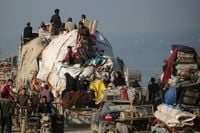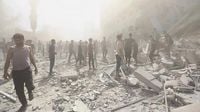Explosions lit up the skies above Gaza City before dawn on Thursday, September 18, 2025, as Israeli forces pressed a fierce ground and air offensive deeper into the densely populated enclave. The campaign, which Israeli officials say is aimed at dismantling Hamas’ military infrastructure, has triggered a wave of fresh displacement and left Gaza’s last lifelines collapsing, according to multiple international agencies and eyewitnesses.
The week’s escalation began on Monday, September 15, when Israel launched a new push into Gaza City, the largest urban center in the Strip and, according to the Israeli military, the “central hub” of Hamas power. By Thursday, troops and tanks were advancing from both the northwest and southeast, effectively “sandwiching” tens of thousands of residents and forcing them toward the coast and the al-Rashid road, the only remaining route south, as reported by Al Jazeera. Infantry, tanks, artillery, and air force units worked in concert, their operations marked by relentless artillery fire, drone strikes, and even remote-controlled explosive devices—so-called “robots”—used to blow up neighborhoods as the army pushed inward.
The result was chaos on the ground. “There is artillery fire, air strikes, quadcopter and drone gunfire. The bombing never stops,” said Aya Ahmed, 32, who was sheltering with 13 relatives in Gaza City, according to AFP. “The world doesn’t understand what is happening. They [Israel] want us to evacuate south—but where will we live? There are no tents, no transport, no money.”
By Thursday, the United Nations estimated that about one million people remained in Gaza City and its surroundings, though Israeli sources claimed 350,000 had already fled. The Palestinian Central Bureau of Statistics placed the number of residents still in the north at roughly 740,000—around 35% of Gaza’s 2.1 million population. Yet, as Israeli advances continued and basic services vanished, the numbers of those able to stay were expected to fall further.
Those who tried to leave faced harrowing conditions. Eyewitnesses described a steady stream of Gazans heading south on foot, in battered vehicles, and even on donkey carts, their meager belongings piled high. “The situation is indescribable—crowds everywhere, the sound of explosions, women and men crying and screaming as they walked while carrying their belongings,” said Shadi Jawad, 47, recounting his family’s ordeal. “God, send a missile to take us out and relieve us.” For many, the price of a ride to the south soared above $1,000, putting escape out of reach for the poorest families (AFP).
Israeli air force and artillery units struck Gaza City more than 150 times during the week, toppling high-rise towers that the military claimed were being used as Hamas observation points, according to Euronews. The strikes were so intense that phone and internet services were cut off, leaving Palestinians unable to call for help, coordinate evacuations, or share details of the unfolding catastrophe. Regulators said the blackout severely hindered relief efforts and the ability to document events on the ground.
Hospitals, already overwhelmed by months of violence and a UN-declared famine, teetered on the brink of collapse. Gaza City’s Al-Shifa Hospital reported receiving the bodies of 33 people killed in Israeli strikes since midnight Thursday, while medical sources cited by Al Jazeera placed the death toll in the city at 40 for that day alone. Across Gaza, the Health Ministry said the total number of Palestinians killed since the start of the conflict had surpassed 65,000, with women and children making up about half the dead. The United Nations considers the ministry’s figures reliable, though it notes the breakdown between civilians and militants is unclear.
The humanitarian situation has become dire. The UN’s humanitarian office (OCHA) warned on Thursday that Gaza City’s “last lifelines” were collapsing, accusing Israel of systematically blocking aid, closing the Zikim crossing to the famine-stricken north, and banning certain food items. “The military incursion and evacuation orders in northern Gaza are driving new waves of displacement, forcing traumatised families into an ever-shrinking area unfit for human dignity,” World Health Organization chief Tedros Adhanom Ghebreyesus posted on X (formerly Twitter). He added, “Hospitals, already overwhelmed, are on the brink of collapse as escalating violence blocks access and prevents WHO from delivering lifesaving supplies.”
International outrage has grown alongside the violence. The United Nations’ Office of the High Commissioner for Human Rights denounced what it called Israel’s “blatant disregard” for international law, citing attacks on internally displaced persons, including as they sought shelter near hospitals or attempted to flee the city. The UN accused Israel of failing to distinguish between combatants and civilians in its air attacks, a fundamental principle of international law.
Meanwhile, the United States again vetoed a UN Security Council resolution calling for a ceasefire, the lifting of aid restrictions, and the return of hostages held by Hamas, shielding Israel from mounting diplomatic pressure. Britain’s permanent representative to the UN, Barbara Woodward, warned that “Israel’s reckless expansion of its military operation takes us further away from a deal which could bring the hostages home and end the suffering in Gaza.”
Hostage families in Israel have taken their anguish to the streets. On Wednesday, protesters dressed in white and symbolically marked with blood gathered near Prime Minister Benjamin Netanyahu’s residence in Jerusalem, demanding action. “We will fight for the return of our children and the restoration of the Israeli ethos,” said Michel Iluz, whose son’s body remains in Gaza. “You will be with us here; we will set up a tent city here, everywhere here. We will sleep here; we will sleep here and stay here and make our voices heard before the Prime Minister, who betrayed us and the values on which we were raised.”
The ground offensive has not been without cost for Israel. The military announced that four of its soldiers were killed by an explosive device in Rafah, in southern Gaza, early Thursday. Outside Gaza, violence spilled over when a Jordanian aid truck driver shot dead two Israeli soldiers at the Allenby crossing between the West Bank and Jordan, prompting Israel to call for a halt to Jordanian aid shipments.
Fighting has also flared along Israel’s northern border, with Israeli strikes targeting Hezbollah sites in southern Lebanon and evacuation orders issued for several villages. Meanwhile, Hamas’s armed wing, the Ezzedine al-Qassam Brigades, vowed to resist Israel’s incursion, stating, “We are ready to send the lives of your soldiers to hell, and we have prepared for you an army of martyrs. Gaza will be a cemetery for your soldiers.”
With the territory already devastated by nearly two years of war, international agencies warn that the latest offensive risks pushing Gaza into an even deeper humanitarian abyss. As the world watches, the fate of both civilians and hostages hangs in the balance, with no clear end in sight.


